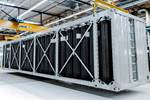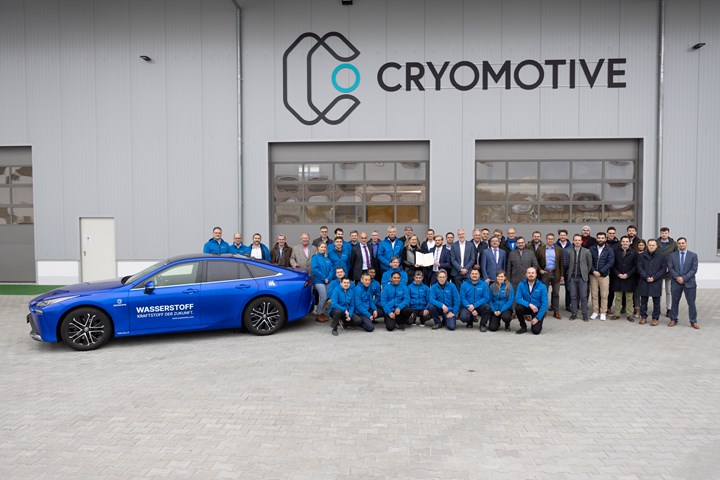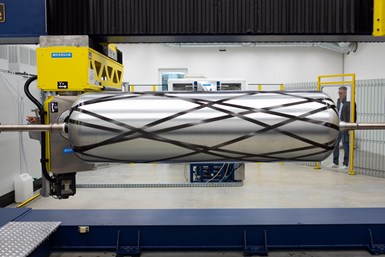Cryomotive opens Hydrogen Storage Manufacturing Center
Cryomotive is to develop, manufacture and assemble Cryogas composite hydrogen tanks for commercial vehicles, buses and ships at new Pfeffenhausen site, accelerating hydrogen refueling systems production for zero-emission commercial vehicles.
German hydrogen mobility startup Cryomotive (Taufkirchen) has inaugurated its hydrogen storage and refueling technology manufacturing center in Pfeffenhausen, Lower Bavaria, based near the Hydrogen Innovation and Technology Center South (ITZ Sued) planned by the German Federal
Ministry for Digital and Transport (BMDV). At this facility, Cryomotive is developing, manufacturing and assembling the first prototypes of Cryogas pressure vessels for heavy-duty commercial vehicles and other mobility applications with high-energy requirements (read “Cryomotive to manufacture first CRYOGAS hydrogen storage vessels using Mikrosam winder” for related info).
Cryogas is a very high-density cryogenic compressed gas that can be produced from either liquid or gaseous hydrogen, which enables Cryomotive’s Cryogas technology to be built on existing gaseous hydrogen infrastructures, as well as use newly emerging liquid hydrogen infrastructure for commercial vehicles.
In addition to this announcement, the BMDV has provided Cryomotive a funding grant for its CryoTRUCK project, in which Cryomotive, together with Germany-based consortium partners MAN Truck & Bus, Clean Logistics, IABG and three chairs of the Technical University of Munich (TUM), are developing and testing the first Cryogas hydrogen tank system for hydrogen trucks in long-distance transport. CryoTRUCK is funded as part of the BMDV’s National Hydrogen and Fuel Cell Technology Innovation Program (NIPII), awarding a total of €9.8 million.
“With alternative drives and fuels, we want to achieve zero-emission logistics on the road,” Dr. Volker Wissing, federal minister for digital and transport, explains. “Around 90% of the CO2 emissions in the transport sector refer to road traffic, with trucks accounting for a third. The development and testing of hydrogen gas tanks and refueling systems for fuel cell trucks in long-haul transport are a valid and important step for more climate protection in transport. I am excited to see the results of the consortium in terms of refueling time and range.”
At the Hydrogen Storage Manufacturing Center, Cryomotive will develop, manufacture and assemble Cryogas hydrogen tanks for commercial vehicles, buses and ships. In Pfeffenhausen, Cryomotive operates a winding machine and furnaces to manufacture carbon fiber-reinforced hydrogen pressure vessels suitable for cryogenic temperatures. This will be followed by assembly equipment for insulation, cabling and control applications, as well as instrumentation for testing. Moreover, for the first time, Cryomotive is combining in-house production of Type 3 pressure vessels for cryogenic
hydrogen gas storage with the assembly of complete tank systems for commercial vehicle applications. The company also expects to use the facility to conduct validation testing. In the medium term, Cryomotive expects the sites personnel requirements will grow from 10 to 25-30 engineers and technicians.
Cryomotive’s Cryogas hydrogen refueling systems reportedly enable long-haul trucks powered by hydrogen fuel cells or hydrogen combustion engines to achieve up to 1,000 kilometers in range per tank filling, with a refueling time of 10-15 minutes.
Related Content
-
3D-printed CFRP tools for serial production of composite landing flaps
GKN Aerospace Munich and CEAD develop printed tooling with short and continuous fiber that reduces cost and increases sustainability for composites production.
-
Plant tour: Albany Engineered Composites, Rochester, N.H., U.S.
Efficient, high-quality, well-controlled composites manufacturing at volume is the mantra for this 3D weaving specialist.
-
Jeep all-composite roof receivers achieve steel performance at low mass
Ultrashort carbon fiber/PPA replaces steel on rooftop brackets to hold Jeep soft tops, hardtops.












.jpg;maxWidth=300;quality=90)




